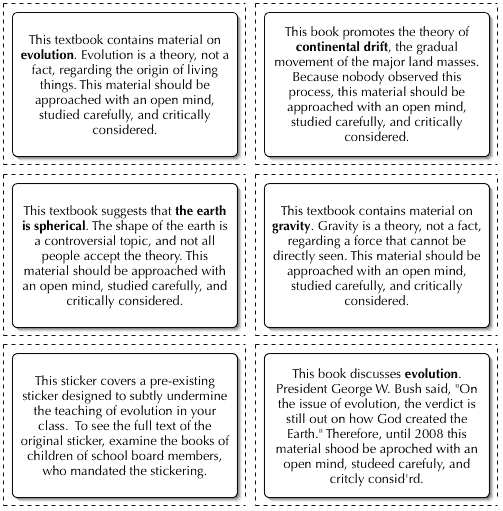Evolution and textbook disclaimers
These science textbook disclaimers from my new heroes at Swarthmore say it all.
The religious right’s long-term plan to take over school boards is really paying off. I am dismayed — no, outraged — that creationism being raised to the same level as evolution in science classrooms across the country, under the guise of a new name (“intelligent design”) and couched in scientific terminology.
Let’s review what “theory” means, shall we? From last month’s National Geographic (emphasis added):
Continental drift is a theory. The existence, structure, and dynamics of atoms? Atomic theory. Even electricity is a theoretical construct, involving electrons, which are tiny units of charged mass that no one has ever seen. Each of these theories is an explanation that has been confirmed to such a degree, by observation and experiment, that knowledgeable experts accept it as fact. That’s what scientists mean when they talk about a theory: not a dreamy and unreliable speculation, but an explanatory statement that fits the evidence. They embrace such an explanation confidently but provisionally … taking it as their best available view of reality, at least until some severely conflicting data or some better explanation might come along
That’s just it. Evolution is science’s best explanation for how life came to be and continues to be. It is accepted by the overwhelming majority of scientists, except for a fringe, vocal few who are by and large motivated by something other than teaching science.
“Evolution should be taught as a scientific theory that is open to critical scrutiny, not as a theory that can’t be questioned”. Sounds reasonable, doesn’t it? We want our children to engage in a healthy exchange of ideas, to examine evidence and explore possible explanations. I sometimes ask myself, “why not ‘teach the controversy’?”
Because there isn’t one worth mentioning.
I do not by any means endorse oversimplifying the curriculum or protecting students from uncomfortable controversy. But there simply isn’t one here. Scientists have come to a consensus in embracing evolution, and that is what we must teach. Not creationism, from which we have moved on, religious feelings notwithstanding. Make no mistake: intelligent design is creationism advocated in terms more palatable than the Bible-based efforts of days gone by to give the impression of credibility. A sound science curriculum must and does teach critical inquiry. The creationist movement plays upon this notion to inject itself directly into the classroom, bypassing critical scrutiny by the scientific community.
And dammit, it’s working.
27 Nov 2004 Sam
